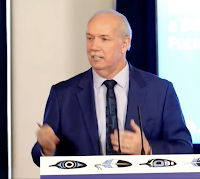Earlier this week, the British Columbia Government outlined its action plan towards furthering the roadmap on consultation and cooperation with Indigenous peoples in the province.
The plan as outlined by Premier John Horgan on Wednesday, is one which will drive change through 89 specific actions in every ministry of the government, framed as part of the provincial implementation of the United Nations Declaration on the Rights of Indigenous Peoples.
Among some of the commitments that are included in the Declaration Act Action Plan:
Recognize Indigenous Peoples’ inherent rights, interests and legal orders
Support Indigenous students to lead graduation rates and pursue to their own excellence
Enable all Indigenous Peoples to live free from racism and discrimination
Share decision-making and pursue new fiscal relationships
Improve the health and well-being of Indigenous families
End the epidemic of Indigenous children in government care.
"Two years ago, the seeds of change were sown – a future rife with the promises of true transformation and reconciliation became possible with the historic passage of the Declaration Act. Make no mistake, there have been and there will continue to be numerous obstacles that challenge the work being done to revolutionize and rebuild a relationship that has long been mired in colonial violence and discrimination.
Today is not only a day of celebration but a day of reflection and accountability. We must reflect on the processes, frameworks and institutions that continue to deny the Title and Rights of First Nations, enact tremendous harm upon our communities and perpetuate a colonial cycle of marginalization and violence.
We must hold our governments and those in positions of power accountable for their actions and their commitments to the Declaration Act. With hope in our hearts we celebrate, reflect and continue the fight for change.”
A full overview, along with further commentary on the Action Plan can be reviewed here.
The full presentation of the Action Plan can be viewed below:
This morning also provided for another pivotal moment towards accountability and responsibility for the past and an opportunity to move forward into the future.
That came out of the Vatican, where Pope Francis apologized to the Indigenous Peoples of Canada for the role of Catholics in the Operation of the residential school system in Canada.
“For the deplorable conduct of those members of the Catholic Church, I ask for God's forgiveness and I want to say to you with all my heart: I am very sorry. And I join my brothers, the Canadian bishops, in asking your pardon.
It is chilling to think of determined efforts to instill a sense of inferiority, to rob people of their cultural identity, to sever their roots, and to consider all the personal and social effects that this continues to entail: unresolved traumas that have become intergenerational traumas,”
Further to his comments, the Pope spoke to what he had heard this week during his discussions with Indigenous leaders, engagements which left him with indignation and shame.
“For the role that a number of Catholics, particularly those with educational responsibilities, have had in all these things that wounded you, in the abuses you suffered and in the lack of respect shown for your identity, your culture and even your spiritual values.”
The Vatican's review of the week can be examined here, the Pope's address and the presentations from the delegation in Rome of today can be reviewed below:
The session with the Pope, one which Assembly of First Nations has described as a historic step, the statement and apology from Pope Francis came following a week of meetings with Indigenous, Inuit and Metis representatives who had come to Rome to address the Vatican on the Residential Schools and to seek acknowledgement of the institutions of the Church in the system.
In addition to the historic words of the Pontiff this morning, came a promise to come to Canada later this year to visit Indigenous communities and to meet with the survivors of those schools and their families.
Towards that Chief Antoine observed of the work ahead in preparation for the Pope's visit and what may come from that encounter in the future.
Further details on the observations from the Indigenous delegation can be reviewed here.
“An apology by the Pope to residential school Survivors and their families delivered in Canada will specifically respond to the Truth and Reconciliation Commission’s Call to Action #58.
More on the visit of the Indigenous representatives can be explored here.
The Prime Minster issued a statement shortly after the Pope's response to Indigenous leaders, noting of the history of the residential school system in Canada and how the Pope's words today will respond to the Truth and Reconciliation Commission calls to Action.
I look forward to His Holiness Pope Francis apologizing in Canada at the request of First Nations, Inuit, and Métis peoples. The Government of Canada is fully committed to implementing the Truth and Reconciliation Commission’s Calls to Action."
More notes on the themes from Victoria and Rome this week can be explored further through our political blog D'Arcy McGee.


No comments:
Post a Comment